Everything I know about living a healthy life has been learned from the good people I’ve met for project research. I’ve enjoyed contracts as an Editor for the Leukaemia Foundation, as Website Consultant to Cambridge’s East Genomics, as Editorial Content Specialist for HCF health fund, as Section Editor on Rodale’s Prevention Australia magazine, as Editor of London’s SweetLife home care magazine, and a writer for the NSW Department of Family and Community Services. As Editorial Consultant to The Atlantic Philanthropies in Australia project, I was also honored to write extensively about Australia’s biomedical research landscape.
FATEFUL DECISIONS: Queensland’s Institute of Molecular Bioscience
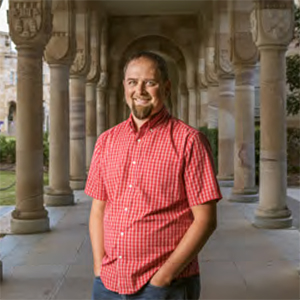 Dr Nathan Palpant, head of the Stem Cells and Cardiovascular Development Lab at The University of Queensland’s Institute of Molecular Bioscience (IMB), has only been in sunny Brisbane for a short time, but already he is recruiting team members to follow him from the University of Washington.
Dr Nathan Palpant, head of the Stem Cells and Cardiovascular Development Lab at The University of Queensland’s Institute of Molecular Bioscience (IMB), has only been in sunny Brisbane for a short time, but already he is recruiting team members to follow him from the University of Washington.
“The U.S. universities where I’ve carried out my research training don’t have nearly the kind of equipment and infrastructure support that we have here at the IMB,” he says. “To me, that’s why the institute performs so well internationally.”
Palpant and his team explore ‘cell fate decisions’, uncovering how cells navigate development in order to form the heart—and how they might be genetically manipulated to regenerate after a heart injury, rather than form a non-functional scar.
Dr Palpant also has interests in bioethics. His two books, Human Dignity in Bioethics and Suffering and Bioethics—co-written while raising a young family and contributing to a stem cell revolution—are stacked in piles beneath his standing desk in preparation for a lecture he is giving across campus.
“We often struggle to know how technology should or should not change our value systems,” he says. “Advances in medicine and technology hold such potential to alleviate suffering. At the same time, we often forget that it is those things in life we most value for which we willingly risk the greatest suffering. For example, our children and family relationships: How do we protect our values and ideals while recognising the good that comes from advances in biomedicine and technology? These are some of the questions I’ve brought forward in these books.”
STRESSED? SING IT OFF says neuroscience
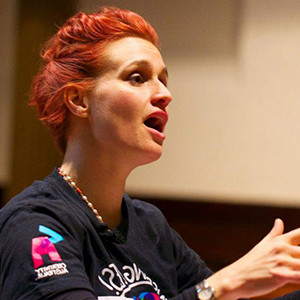 Sure, it could be the feel-good endorphins or the community-loving oxytocin.
Sure, it could be the feel-good endorphins or the community-loving oxytocin.
It could be taking an hour’s break away from the Christmas madness and the stress of work. Or it could be the obvious joy in one singer’s shoulders as she belts out a ramshackle melody, eyes closed and head raised to let the sound pour out. Whatever the cause, I’m blubbing like a baby. And singing.
To be honest, I was never going to make it very far through ‘Lean On Me’ or ‘Over The Rainbow’ without crying. I’m like that. But the miracle of my experience singing with the Creativity Australia With One Voice Sydney Sings choir happens after the crying stops: I’m still singing. And it feels good.
Surrounded by complete strangers, I’m getting an ab-workout to Pavarotti’s ‘O Sole Mio’, and channeling Michael Jackson for ‘We Are The World’. I’m not a singer, I don’t know half the words, and I don’t know any of these people. But the right lobe of my brain is getting off on this singing business, and I’m not stopping for anyone.
“I was in hospital for the last four weeks,” the woman next to me says in broken English. “I discharge to come to choir.” “I hope you are alright,” I whisper to her between songs. “Better now,” she beams, songbook in hand.
THE CAMBRIDGE CONNECTION: On-the-ground genomics
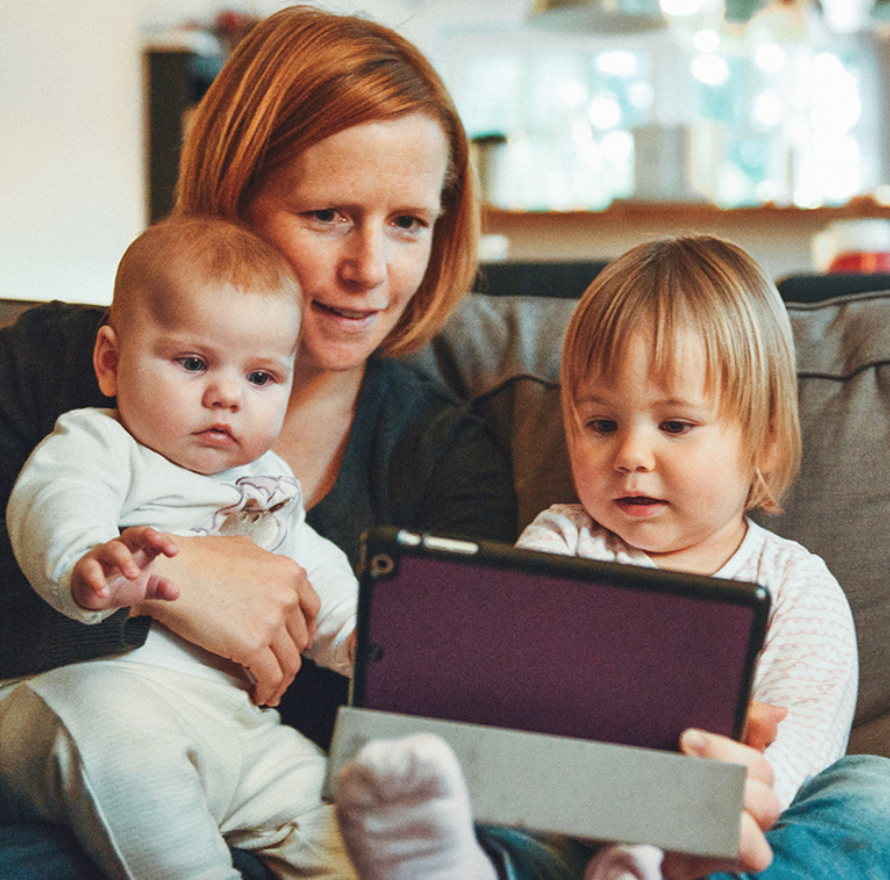 The NHS Genomic Medicine Service is the world’s leading national genomic healthcare service. Launched in 2018, it harnesses the power of genomic technology and science to improve the health of our population. The service ensures that genomic medicine around the country is coordinated, consistent, and centrally managed at a national level.
The NHS Genomic Medicine Service is the world’s leading national genomic healthcare service. Launched in 2018, it harnesses the power of genomic technology and science to improve the health of our population. The service ensures that genomic medicine around the country is coordinated, consistent, and centrally managed at a national level.
The East of England is the home of genomic innovation. The term ‘genetics’ and the study of DNA were both born in Cambridge, the technique of DNA ‘fingerprinting’ was discovered in Leicester, and our region is rich in genetics-related research, teaching, and events.
Between 2012 and 2018 thousands of individuals and families from the East of England participated in the 100,000 Genomes Project. This groundbreaking initiative, led by Genomics England and NHS England, reached its goal of sequencing 100,000 whole genomes from NHS patients with a rare disease, their families, and patients with cancer in December 2018.
The information gathered through the Project is now powering our next leap in transforming treatments and diagnoses for people across our country. The more genetic information we have, the earlier clinicians can predict, diagnose and treat illness in a way that works best for every patient.
East Genomics brings together patient care teams, laboratories, and researchers to deliver the benefits of the NHS Genomic Medicine Service to communities across the East Midlands and East of England. Together, we’re converting cutting-edge science into better health for everyone.
FROM THE HEART: Diabetes in the desert
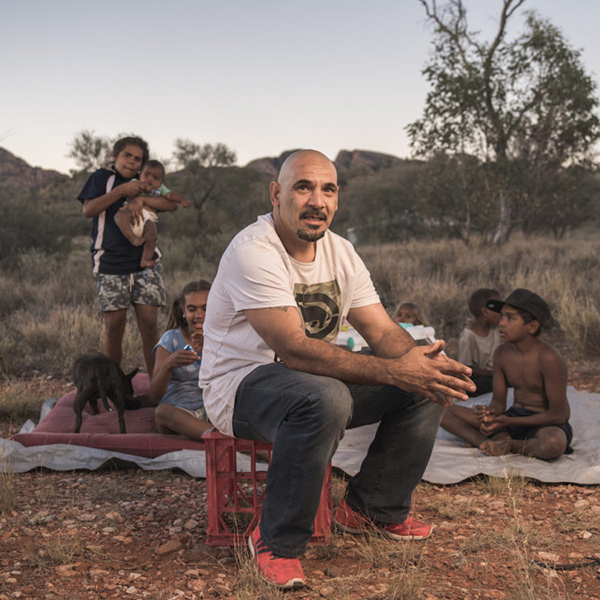 Ricky Mentha is a member of the Gippsland Kurnai people, and an Indigenous research fellow and capacity development coordinator at Baker Heart and Diabetes Institute Central Australia in Alice Springs. His primary research interests include circulatory system disease, and the mental health and wellbeing of Indigenous Australians. Among Mentha’s work in the Alice is his paper, Bringing our voices into the research world: Lessons from the Kanyini Vascular Collaboration.
Ricky Mentha is a member of the Gippsland Kurnai people, and an Indigenous research fellow and capacity development coordinator at Baker Heart and Diabetes Institute Central Australia in Alice Springs. His primary research interests include circulatory system disease, and the mental health and wellbeing of Indigenous Australians. Among Mentha’s work in the Alice is his paper, Bringing our voices into the research world: Lessons from the Kanyini Vascular Collaboration.
“We were worried about research being done to Indigenous people without their consent or apparent benefit to them,” Mentha says of the project. “We began to understand that the ability of Indigenous people to navigate care pathways is limited by language, different world views, social position and understanding of the severity of the complications relating to chronic diseases.”
Outcomes of the study have included the development, with local Indigenous language speakers, of a DVD for use as part of the informed consent process when recruiting Aboriginal research participants from Central Australia. The recruits will take part in a Baker clinical trial of a combination polypill of heart medications.
“I knew I wanted to do something useful and give back to my people,” he says of his work. “I hadn’t realised how great an impact poverty is having on health outcomes for Aboriginal people.”
NOSH FOR YOUR NOGGIN: Neuro nutrition
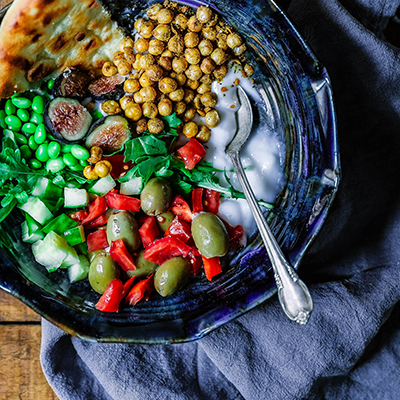 A smorgasbord of scientific research shows that positive changes on your plate can not only reap brain benefits for protecting against the risks of developing dementia, but may also support the brain health of people already diagnosed with mild cognitive impairment.
A smorgasbord of scientific research shows that positive changes on your plate can not only reap brain benefits for protecting against the risks of developing dementia, but may also support the brain health of people already diagnosed with mild cognitive impairment.
Regularly tuck into these brain boosters:
Oily fish, seeds and nuts: Omega-3 fatty acids play an important role in healthy brain ageing. Good sources of Omega-3 are seeds, nuts, and fresh oily fish such as salmon, mackerel, sardines and tuna. Eat oily fish three times a week or slip a fish oil supplement into your day. Fish benefits also include vitamin D – a defensive element against vitamin D deficiency, linked to memory decline.
Vegies, olive oil and pulses: The ‘Mediterranean diet’ – high in vegetables, fish, olive oil, pulses, fruits and whole grains, and low in sugar, meat, dairy, and trans fats – is another brain back-up. High levels of natural antioxidant nutrients such as vitamin E, C, and phytonutrients (plant-based nutrients) pack the Mediterranean diet with neurological punch.
Leafy greens, eggs and grains:Green leafy vegies are loaded with folate and folic acid (forms of vitamin B), eggs are little B-12 bombs, and whole unrefined grains are B-eautiful for your brain. B vitamins have been shown to lower homocysteine – a naturally occurring amino acid found in the blood, which in high levels is associated with an increased risk of dementia. B-complex supplements are available from health food shops; speak to a specialist about the best supplement for you.
FINDING HAPPINESS: Rebekka’s story
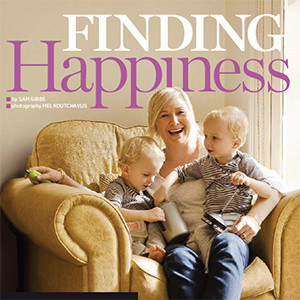 “Last night, I lay in bed thinking: Why does life have to be so hard? I suppose everyone wonders that sometimes.
“Last night, I lay in bed thinking: Why does life have to be so hard? I suppose everyone wonders that sometimes.
Before I was involved in the Making Australia Happy documentary, I didn’t have a response to that question. Now I know the answer: life just is hard sometimes, and that’s okay. It seems like such a simple thing, but it’s a very powerful idea. I’m 40 years old and married with twin 3-year-old boys, and I have a part-time admin job. I still have my down days, but since Making Australia Happy, I’ve changed enormously. Here’s what I learned about how to be happy:
Get a tune-up: Twelve months ago, I had knee surgery and felt like I had broken down, like I wasn’t driving my own body. It was as though I were in the hire car you get as a replacement while yours is in for repairs. Nothing felt right. But during the Making Australia Happy project, I started doing Pilates and concentrated on making my knee better.
I finally feel like I’m back in my own car, and it’s running the way it should! Body and mind are so connected that even sitting up straight can change the way you look at the world. Now I run 12 km in the mornings; it feels incredible.”
RESILIENCE IN CARE: Brexit and the social care sector
 Brexit bureaucracy, election expectations, NHS naysaying, and anxieties about ageing – there’s a lot of grey news to cloud the outlook of people wondering what care will look like for themselves and their loved ones in coming decades.
Brexit bureaucracy, election expectations, NHS naysaying, and anxieties about ageing – there’s a lot of grey news to cloud the outlook of people wondering what care will look like for themselves and their loved ones in coming decades.
At SweetTree, we’ve spent 15 years adapting to the changing needs of society and increased demand for great quality home care, and we’re in a good position to now reflect on what the future might hold, and how families can step up to meet coming changes, head-on.
In 1951 – the year that The Archers first graced our airwaves – only 25.5 out of every 100 Britons made the ripe old age of 80. With today’s figures showing roughly 66 in every 100 striding into their 80s with golf clubs and yoga mats over shoulders, we’re faced with a completely blank canvas when it comes to what history can show us about supporting so many at such an age.
It’s hardly surprising then that the social care sector is going through a turbulent transition into this brave new world.
THE WOW PROJECT: “I’m no longer weighed down”
 The Prevention Australia Walk Off Weight project required five Australian women to follow a nutrition and walking plan for eight weeks. As Fitness and Walking Editor at Prevention, it was my responsibility to recruit participants, source a life coach and dietician to assist with the project, and guide the volunteers through the program.
The Prevention Australia Walk Off Weight project required five Australian women to follow a nutrition and walking plan for eight weeks. As Fitness and Walking Editor at Prevention, it was my responsibility to recruit participants, source a life coach and dietician to assist with the project, and guide the volunteers through the program.
A sample of the WOW program, and a feature about the successes of our Australian volunteers, were both published in Prevention Australia magazine. A Walk Off Weight book, generated by Rodale’s Prevention brand in the United States, was launched off the back of this editorial project in Australia.
Success Story: “For years, my doctors have been telling me to walk, but it wasn’t until WOW that I believed it was something for me. Two years ago, I was diagnosed with lymphoma, and it really knocked me over. Six weeks of radiation only added to my stress, and I couldn’t get out of that tired place – until Prevention’s WOW plan.
I’ve never had time in my day for myself, but now I’m up at 5.45 am every day for my morning walk. I actually bounce out of bed! I love the walking; it’s just me, the flowers and the dogs in the park. I feel 10 years younger and I’m glowing with energy. The WOW diet and recipes have given me new ideas, and I crave snacks and an afternoon sugar hit less than ever before.
I’ve lost four kilos, changed my body shape, improved my circulation and come off my blood-pressure medication. Above all, I’m no longer weighed down by worries and exhaustion. I sleep so much better and my outlook has become so much more positive. I keep saying, ‘Yes, I can do it’. And I can.” – Julie Muldowney, 56, business administrator.

